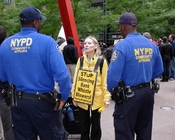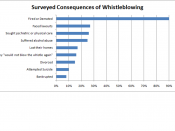What is a whistleblower? The dictionary defines a whistleblower as one who reveals wrongdoing within an organization to the public or to those in positions of authority. Whistleblowers are often misjudged. People view them as traitors when all they really want is to fix the problem or the injustice. Seemingly, a whistleblower tends to be the kind of person who has to do the right thing, which is telling the truth. Many whistleblowers did not set out to risk their lives. They know the telling truth will have consequences. They must first investigate and collect enough evidence before deciding to blow the whistle. The act of investigating, analyzing, and considering solutions is the activity of critical thinking. Therefore, whistleblowing, is an act representative of critical thinkers.
Whistleblowers take huge personal and business risks to blow the whistle on what went wrong inside an organization. For instance, there is Dr. Jeffrey Wigand, the tobacco company researcher who exposed his employer on "60 Minutes" for lying about the dangers of smoking.
There is Randy Robarge, a former radiation protection supervisor at Com Ed?s nuclear power plant in Zion. He blew the whistle in 1996 on alleged procedural violations he feared could lead to a catastrophic event. There is Karen Silkwood, a chemical technician at the Kerr-McGee's plutonium fuels production plant in Crescent, Oklahoma, and a member of the Oil, Chemical, and Atomic Workers' Union. She was also an activist who was critical of plant safety. Wigand and Robarge were both fired. Karen Silkwood died on November 13, 1974 in a fatal one-car crash. Their jobs, their health, their privacy, their sanity, their life?they risked all of them to bring us badly needed word of trouble inside crucial institutions.
When examining Jeffrey Wigand, it is clear that whistleblowing is an act representative...


